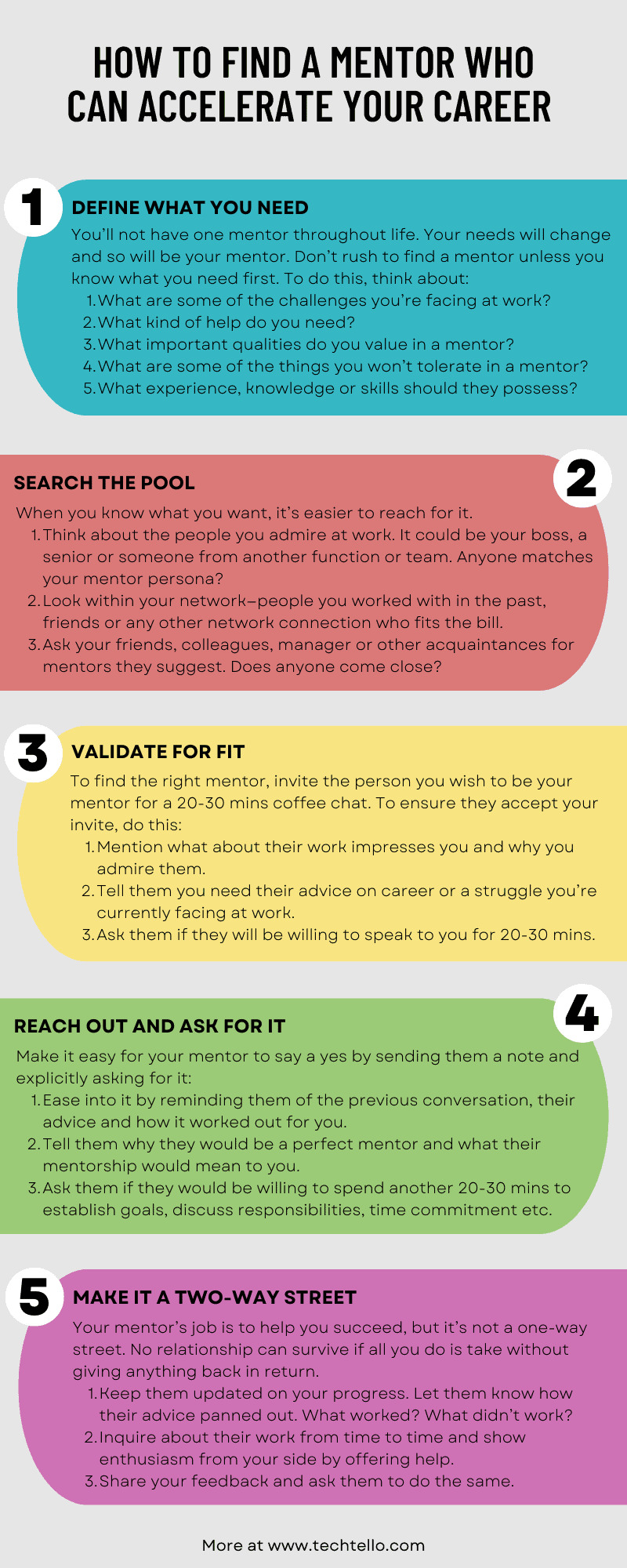How To Find a Mentor Who Can Accelerate Your Career

Good mentors help unlock your hidden potential. They may not only offer advice when you’re stuck with a problem but also help you get over your own limiting beliefs. They tell you things you may not want to hear which keeps you grounded in reality. They’re your sounding board to determine which ideas are feasible and practical and which ones aren’t worth pursuing. With the support of a good mentor, you can build a kick-ass career instead of simply dragging your feet.
But how do you find such a person and why should they mentor you? What should you do to turn this into a long-lasting relationship instead of a one-way deal? Most people want to be mentored but aren’t willing to put in the effort to find the right mentor. They either blame the organization or hold their boss responsible for not getting the mentorship they need.
Often what starts as harmless self-pity turns into a victim mentality:
I don’t know who to ask for help.
I have no one to guide me.
My boss doesn’t care about my growth.
My workplace sucks. No one’s invested in me.
I am never going to succeed.
Victim mindset makes you accept defeat. You refuse to take responsibility and leave it to others or a stroke of luck to get what you need. To find the right mentor, the first step is a shift in beliefs—stop blaming others and take ownership. You’re responsible for finding the right mentor, not your organization or your boss. It’s not their career, it’s yours.
Once you’re willing to put in the effort and make it work, follow these 5 steps to approach a mentor. You’ll not only find the perfect mentor by your side but also feel empowered to take your career where it needs to be.
It’s time to WAKE UP and make empowering choices.
― Darren Hardy, The Compound Effect
5 steps to find the right mentor who can help you grow
Step 1: Define what you need
You’ll not have one mentor throughout life. Your needs will change and so will be your mentor.
Don’t rush to find a mentor unless you know what you need first. To do this, think about:
- What are some of the challenges you’re facing at work?
- What kind of help do you need?
- What important qualities do you value in a mentor? For example, someone who trusts you, treats you with respect, values your inputs, etc.
- What are some of the things you won’t tolerate in a mentor? For example, someone with a my way or highway attitude, who looks down upon you, or who has anger issues.
- What experience, knowledge or skills should they possess?
Create a persona of this mentor in your mind and map it to your needs. Visualize working with them—collaborating on problems, learning new skills and finding better ways of doing things. How do they make you feel?
Once you have created a mental image of your mentor, the next step is to start the search.
Step 2: Search the pool
When you know what you want, it’s easier to reach for it. With the mentor sketched out, do this:
- Think about the people you admire at work. It could be your boss, a senior or someone from another function or team. Anyone matches your mentor persona?
- Look within your network—people you worked with in the past, friends or any other network connection who fits the bill.
- Ask your friends, colleagues, manager or other acquaintances for mentors they suggest. Does anyone come close to what you need?
At this point, don’t let your self-limiting beliefs reject potential mentors with the thinking that they will never agree to it. Give yourself permission to be surprised. Don’t be too picky either. Be flexible and don’t reject mentors without first giving it a try.
Once you have these mentors shortlisted, stack rank them in order of your preference. Then repeat the next two steps till you lock down on one. You don’t have to do it for every person on the list—that will be time-consuming and unnecessary. Just stop as soon as you find the one who agrees to it.
Step 3: Validate for fit
While the picture of that mentor you have in mind appears perfect from a distance, what evidence do you have? You can’t know someone unless you have actually tested them in reality.
How can you be sure that they’re really the right fit for you (and you for them)? How can you make sure they understand your challenges and what you need from them? You shouldn’t ask them to mentor you without being sure. Remember: there’s no backing off once they say a yes.
To find the right mentor, invite the person you wish to be your mentor for a 20-30 mins coffee chat. To ensure they accept your invite, do this:
- Mention what about their work impresses you and why you admire them. Share examples, instances or any other piece of information that makes it authentic and doesn’t look like flattery.
- Tell them about your work and a little bit about yourself. Don’t shy away from sharing a few personal details—it is what connects.
- Tell them you need their advice on career or a struggle you’re currently facing at work. Mention they are the best person to help you with this.
- Ask them if they will be willing to speak to you for 20-30 mins.
It will be very difficult for them to reject a request from someone who values their experience and expertise. When you meet them, don’t be too formal. Start by thanking them for their time, ask a few casual questions and then seek their advice on career or a work-related struggle.
Keep the purpose of your conversation to get to know them and evaluate if they’re the right fit for you:
- Do they understand your struggle?
- Did they focus on solving your problem or just impressing you?
- How much did they listen as opposed to speaking?
- Did you feel the connection? Was it a good conversation?
- Do you want them to mentor you?
If the answer to the last question is yes, put their advice to practice. Wait 2-3 weeks and then move on to the next step. Irrespective of your decision, appreciate their time and send them a thank you note after the meeting.
Step 4: Reach out and ask for it
People appreciate when you state your intentions clearly and explicitly ask for what you need instead of having them interpret it. Make it easy for your mentor to say a yes by sending them a note and explicitly asking for it:
- Ease into it by reminding them of the previous conversation, their advice and how it worked out for you.
- Tell them why they would be a perfect mentor and what their mentorship would mean to you.
- Show curiosity to learn from them, take their advice seriously and commit to doing whatever it takes to build a thriving mentor-mentee relationship.
- Ask them if they would be willing to spend another 20-30 mins to establish goals, discuss responsibilities, time commitment, and other communication preferences to take this further.
- End by stating that you’d be grateful to have them as a mentor and will do your best to be a good mentee to them.
To realize value, mentoring partners must create relationships where both mentor and mentee can show up fully and authentically.
― Lois J. Zachary, The Mentor’s Guide
Don’t take it to heart if they reject the idea to mentor you. It’s not personal. Don’t overthink their decision as you will never know the reason—you don’t know how busy they are or what other priorities made them say no. Instead, thank them for replying to your message and repeat steps 3 and 4 with another potential mentor. All this effort will be worth it with the right mentor by your side to coach you and guide you as you reach for your dreams.
Step 5: Make it a two-way street
Most mentees make this mistake. They spend all their time and energy identifying what they can get from the relationship without focusing on what the mentor gets in return. After all, if your mentor is spending so much time, and sharing their resources and experience with you, shouldn’t there be something in it for them?
Your mentor’s job is to help you succeed, but it’s not a one-way street. No relationship can survive if all you do is take without giving anything back in return.
To build a thriving relationship with your mentor, do this:
- Keep them updated on your progress. Let them know how their advice panned out. What worked? What didn’t work? Even if the outcome does not match their expectations, there will be learning in it for them.
- Inquire about their work from time to time and show enthusiasm from your side by offering help and supporting them.
- Share your feedback and ask them to do the same. They will value the opportunity to become a better mentor to you and others.
One of the most beneficial aspects of mentoring is its inherent reciprocity. When reciprocity is present, both mentor and mentee fully engage in the relationship.
― Lisa Fain, Bridging Differences for Better Mentoring
People remember good mentors and mentees throughout their life. Even if their path goes separate ways, the journey stays with them forever. Good mentees can become successful mentors one day. Do your best to find the right mentor and nurture this relationship.
Summary
- A good mentor can guide you, empower you, increase your confidence, push you out of your comfort zone and help you reach your potential. But you can’t find a mentor unless you’re willing to put in the effort.
- Start with defining what you need from a mentor—what challenges are you facing, what help do you need, what experience should they have and what qualities they need to possess? Create a mental image of this mentor.
- Now, search for this mentor in your available pool—look around the office, other network connections or ask for advice from friends and coworkers. Stack rank the list in order of preference.
- Before making a request to be your mentor, validate if they’re the right fit for you. To do this, set up a small meeting and ask for their advice on career or a work-related issue.
- Once you’re convinced to take this forward, explicitly make a request and ask for it.
- Strengthen the relationship by shifting from being a taker to giving back in return.

































